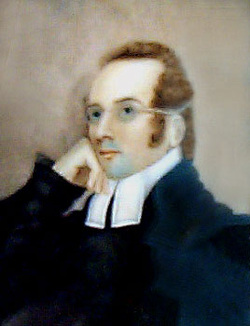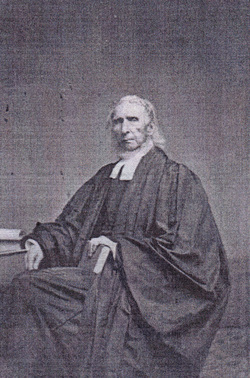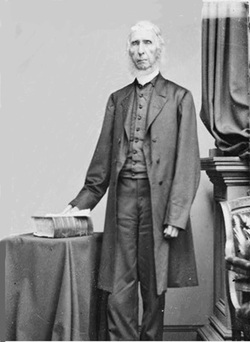The Rev. Dr. William Edward Wyatt
(1789-1864)

William Edward Wyatt
WILLIAM EDWARD WYATT was born in Manchester, in the British Province of Nova Scotia, on the ninth day of July, seventeen hundred and eighty-nine (to Mary Winslow and James Wyatt). The next year his parents removed to the City of New York, where he was brought up, and educated at Columbia College, in the same class with the two Bishops Onderdonk, Bishop Kemper, and Judge Murray Hoffman. He took the degree of B. A. in eighteen hundred and nine, and that of M. A. in eighteen hundred and sixteen. It should be mentioned that he received his preparatory education at the school of the Reverend William Barry, who educated many distinguished clergymen and laymen.
He soon devoted himself to the sacred ministry, commenced the study of theology under the direction of Doctor, afterwards Bishop, Hobart, and was admitted a Candidate for Orders about a month after his graduation. He was ordained Deacon by Bishop Benjamin Moore, in September, eighteen hundred and ten, and Priest by Bishop Hobart in October, eighteen hundred and thirteen. On the eighth of February, eighteen hundred and eleven, he was settled as the minister of the Church in Newtown, Long Island, and, during his residence there, officiated for several months on Sunday afternoons
in the City of New York, in connection with Trinity Church.
On the first of October, eighteen hundred and twelve, he married Miss Frances Billop, with whom he lived happily more than fifty-one years. They were not separated until after he was confined to his bed by his last sickness. She bore him eleven children seven sons and four daughters of whom five sons and three daughters survive; two of the sons are clergymen of the Church.
He soon devoted himself to the sacred ministry, commenced the study of theology under the direction of Doctor, afterwards Bishop, Hobart, and was admitted a Candidate for Orders about a month after his graduation. He was ordained Deacon by Bishop Benjamin Moore, in September, eighteen hundred and ten, and Priest by Bishop Hobart in October, eighteen hundred and thirteen. On the eighth of February, eighteen hundred and eleven, he was settled as the minister of the Church in Newtown, Long Island, and, during his residence there, officiated for several months on Sunday afternoons
in the City of New York, in connection with Trinity Church.
On the first of October, eighteen hundred and twelve, he married Miss Frances Billop, with whom he lived happily more than fifty-one years. They were not separated until after he was confined to his bed by his last sickness. She bore him eleven children seven sons and four daughters of whom five sons and three daughters survive; two of the sons are clergymen of the Church.
1814 - Chosen Associate Rector

In the spring of eighteen hundred and fourteen he was chosen Associate Rector of St. Paul's Parish, Baltimore. The senior
Associate Rector was the Reverend James Kemp, D. D., who, on the first of September following, was consecrated
Suffragan Bishop of Maryland, with a right of succession to the Diocesan Episcopate, which afterwards took effect. By this event Dr. Wyatt ceased, as the law then stood, to be Associate Rector, and became Associate Minister, with the right of succession to the rectory. To this office he was instituted in Christ Church, then a chapel of ease to St. Paul's Parish, on the sixteenth of October, eighteen hundred and fourteen. In October, eighteen hundred and twenty-seven, he became, upon the death of Bishop Kemp, the sole rector, and continued such until his death, on the twenty-fourth of June, eighteen hundred and sixty-four, more than fifty years after he had entered upon the duties of Associate Rector.
During this time he twice visited Europe, in eighteen hundred twenty-two and eighteen hundred forty-five. So early as eighteen hundred eighteen, he was elected Professor of Theology in the University of Maryland, and in eighteen hundred twenty received from that Institution the degree of Doctor in Divinity. It is more important to remember that, for many years, he acted as the gratuitous Chaplain of the Maryland Penitentiary, with great industry and zeal and with very good effect.
From the Diocese of Maryland he received all the honors which she could bestow, except the Episcopate. He was very early elected a member of the Standing Committee, and continued one until his death, except during the time in which he filled the office of President of the Convention. In his earlier years he was Secretary, and in his later, President of the Committee. He was also, for some years, Secretary of the Convention. He was elected a member of the General Convention in eighteen hundred seventeen, and sat in every Convention afterwards until his death, when he was the oldest
member of the House of Clerical and Lay Delegates. In eighteen hundred twenty-eight he was chosen President of the House, and afterwards re-elected seven times, until in eighteen hundred fifty-three he declined a re-election.
Upon the meeting of the Diocesan Convention in eighteen hundred twenty-eight, when the Episcopate was vacant by the death of Bishop Kemp, he was chosen by the High Churchmen of the Diocese to be their candidate for the succession. A majority of the clergy, sympathizing with the party, which called itself Evangelical, preferred Dr. Johns, now Bishop of Virginia. They were, however, not strong enough to nominate him to the laity, because the Constitution of the Diocese required, for that purpose, a two-thirds vote. Of the laity a very large majority preferred Dr. Wyatt. The majority was more than enough to overbalance, in joint ballot, the majority of the clergy. Dr. Wyatt was elected President of the Convention, and was annually re-elected during the vacancy in the Episcopate. This gave him, under the Diocesan Constitution, all the
authority of a Bishop of Maryland, so far as it could be exercised by one who was not a Consecrated Bishop. The consecration of Bishop Stone on the twenty-first of October, eighteen hundred and thirty, determined the office of the President of the Convention.
Bishop Stone died in February, eighteen hundred and thirty-eight, before the meeting Of the Convention for that year. When the meeting took place, Dr. Wyatt was nominated for President, but Dr. Johns was elected by a majority of one. It being afterwards discovered that one or more votes had been cast for Dr. Johns by persons who were not properly entitled to seats in the Convention, he very honorably offered to resign; but the Convention unanimously refused to accept the resignation. Drs. Wyatt and Johns were nominated to fill the vacant Episcopate, when Dr. Wyatt read a document, signed by both, declining an election, and recommending Dr. Alonzo Potter, now Bishop of Pennsylvania. This compromise was not approved by a majority of the clergy, and a candidate was nominated in opposition to Dr. Potter, Dr. Henshaw, afterwards Bishop of Rhode Island. Dr. Potter's name was then withdrawn, and several ballots taken among the clergy, sometimes the candidates being Dr. Wyatt and Dr. Johns, and sometimes Dr. Potter and Dr. Johns. None of the three were able to obtain a two-thirds vote. Finally, all three names were withdrawn, and an informal ballot of the clergy was taken between the Reverend Dr. Hawks and the Reverend Dr. Eastburn, now Bishop of Massachusetts. The informal ballot was in favor of Dr. Eastburn by a very small majority. In compliance with an agreement previously entered into, he was
constitutionally nominated and confirmed.
Dr. Eastburn having declined the election, a special Convention was held on the second of August, eighteen hundred and thirty-eight. After many ballots among the clergy, in which Dr. Wyatt, Dr. Johns and Dr. Henshaw were named, the two first named formally retired from the contest. Dr. Wyatt then asked leave to name four clergymen, among whom he hoped that a choice might be made. They were Bishop Kemper, then a Missionary Bishop, now Bishop of Wisconsin, Dr. Whittingham, now Bishop of Maryland, Dr. Taylor, of Grace Church, New York, and Mr. Johnson, of Alexandria. After
some conversation, during which it appeared that Dr. Kemper would be agreeable to Dr. Johns, but not to all his friends, Dr. Wyatt formally nominated Bishop Kemper, and he was elected, by large majorities of both Orders, but declined serving.
At the annual Convention of eighteen hundred thirty-nine an attempt was made to continue Dr. Johns in the chair, by refusing to go into an election of President. If the vote were taken by Orders, a majority of the clergy would have been able to prevent an election; but Dr. Johns defeated the movement by resigning. Dr. Wyatt was elected President, and again in the following year. During this Convention, it was agreed to submit the names of the Reverend Dr. Hawks and the
Reverend Dr. Dorr, of Philadelphia, to a joint ballot, and that he who had the majority on that ballot should not be opposed at the constitutional election. One hundred and nine votes were cast, of which Dr. Dorr received sixty-six, and Dr. Hawks forty-two. The former was afterwards constitutionally elected; but he also refused to serve.
Associate Rector was the Reverend James Kemp, D. D., who, on the first of September following, was consecrated
Suffragan Bishop of Maryland, with a right of succession to the Diocesan Episcopate, which afterwards took effect. By this event Dr. Wyatt ceased, as the law then stood, to be Associate Rector, and became Associate Minister, with the right of succession to the rectory. To this office he was instituted in Christ Church, then a chapel of ease to St. Paul's Parish, on the sixteenth of October, eighteen hundred and fourteen. In October, eighteen hundred and twenty-seven, he became, upon the death of Bishop Kemp, the sole rector, and continued such until his death, on the twenty-fourth of June, eighteen hundred and sixty-four, more than fifty years after he had entered upon the duties of Associate Rector.
During this time he twice visited Europe, in eighteen hundred twenty-two and eighteen hundred forty-five. So early as eighteen hundred eighteen, he was elected Professor of Theology in the University of Maryland, and in eighteen hundred twenty received from that Institution the degree of Doctor in Divinity. It is more important to remember that, for many years, he acted as the gratuitous Chaplain of the Maryland Penitentiary, with great industry and zeal and with very good effect.
From the Diocese of Maryland he received all the honors which she could bestow, except the Episcopate. He was very early elected a member of the Standing Committee, and continued one until his death, except during the time in which he filled the office of President of the Convention. In his earlier years he was Secretary, and in his later, President of the Committee. He was also, for some years, Secretary of the Convention. He was elected a member of the General Convention in eighteen hundred seventeen, and sat in every Convention afterwards until his death, when he was the oldest
member of the House of Clerical and Lay Delegates. In eighteen hundred twenty-eight he was chosen President of the House, and afterwards re-elected seven times, until in eighteen hundred fifty-three he declined a re-election.
Upon the meeting of the Diocesan Convention in eighteen hundred twenty-eight, when the Episcopate was vacant by the death of Bishop Kemp, he was chosen by the High Churchmen of the Diocese to be their candidate for the succession. A majority of the clergy, sympathizing with the party, which called itself Evangelical, preferred Dr. Johns, now Bishop of Virginia. They were, however, not strong enough to nominate him to the laity, because the Constitution of the Diocese required, for that purpose, a two-thirds vote. Of the laity a very large majority preferred Dr. Wyatt. The majority was more than enough to overbalance, in joint ballot, the majority of the clergy. Dr. Wyatt was elected President of the Convention, and was annually re-elected during the vacancy in the Episcopate. This gave him, under the Diocesan Constitution, all the
authority of a Bishop of Maryland, so far as it could be exercised by one who was not a Consecrated Bishop. The consecration of Bishop Stone on the twenty-first of October, eighteen hundred and thirty, determined the office of the President of the Convention.
Bishop Stone died in February, eighteen hundred and thirty-eight, before the meeting Of the Convention for that year. When the meeting took place, Dr. Wyatt was nominated for President, but Dr. Johns was elected by a majority of one. It being afterwards discovered that one or more votes had been cast for Dr. Johns by persons who were not properly entitled to seats in the Convention, he very honorably offered to resign; but the Convention unanimously refused to accept the resignation. Drs. Wyatt and Johns were nominated to fill the vacant Episcopate, when Dr. Wyatt read a document, signed by both, declining an election, and recommending Dr. Alonzo Potter, now Bishop of Pennsylvania. This compromise was not approved by a majority of the clergy, and a candidate was nominated in opposition to Dr. Potter, Dr. Henshaw, afterwards Bishop of Rhode Island. Dr. Potter's name was then withdrawn, and several ballots taken among the clergy, sometimes the candidates being Dr. Wyatt and Dr. Johns, and sometimes Dr. Potter and Dr. Johns. None of the three were able to obtain a two-thirds vote. Finally, all three names were withdrawn, and an informal ballot of the clergy was taken between the Reverend Dr. Hawks and the Reverend Dr. Eastburn, now Bishop of Massachusetts. The informal ballot was in favor of Dr. Eastburn by a very small majority. In compliance with an agreement previously entered into, he was
constitutionally nominated and confirmed.
Dr. Eastburn having declined the election, a special Convention was held on the second of August, eighteen hundred and thirty-eight. After many ballots among the clergy, in which Dr. Wyatt, Dr. Johns and Dr. Henshaw were named, the two first named formally retired from the contest. Dr. Wyatt then asked leave to name four clergymen, among whom he hoped that a choice might be made. They were Bishop Kemper, then a Missionary Bishop, now Bishop of Wisconsin, Dr. Whittingham, now Bishop of Maryland, Dr. Taylor, of Grace Church, New York, and Mr. Johnson, of Alexandria. After
some conversation, during which it appeared that Dr. Kemper would be agreeable to Dr. Johns, but not to all his friends, Dr. Wyatt formally nominated Bishop Kemper, and he was elected, by large majorities of both Orders, but declined serving.
At the annual Convention of eighteen hundred thirty-nine an attempt was made to continue Dr. Johns in the chair, by refusing to go into an election of President. If the vote were taken by Orders, a majority of the clergy would have been able to prevent an election; but Dr. Johns defeated the movement by resigning. Dr. Wyatt was elected President, and again in the following year. During this Convention, it was agreed to submit the names of the Reverend Dr. Hawks and the
Reverend Dr. Dorr, of Philadelphia, to a joint ballot, and that he who had the majority on that ballot should not be opposed at the constitutional election. One hundred and nine votes were cast, of which Dr. Dorr received sixty-six, and Dr. Hawks forty-two. The former was afterwards constitutionally elected; but he also refused to serve.
1864 - Served for 51 years

In November, eighteen hundred thirty-nine, another special Convention was held, in which Dr. Wyatt presided, and, in his address, withdrew his name as a candidate. It was agreed that two names should be submitted to the Convention, and that the Orders should ballot for them separately until the same person should have received two-thirds of the votes of both Orders, when a constitutional election should be gone into. The names fixed upon were those of Dr. Whittingham and the Reverend H. V. D. Johns. Nine ballots took place, in each of which Dr. Whittingham had a majority of both Orders, but not two-thirds of either. At the tenth ballot both names were withdrawn, and those of Drs. Wyatt and John Johns substituted for them. Among the clergy Dr. Johns had a majority of one vote. Among the laity Dr. Wyatt had a majority of eight. He then finally withdrew his name, which was not afterwards used. The Convention then proceeded to a constitutional ballot between Dr. Taylor, of New York, who had been nominated by Dr. Wyatt, and Dr. John Johns. On two ballots Dr. Taylor had a majority, but nothing like a two-thirds vote. He was then dropped, and the late Dr. George McElhiney nominated. Dr. Johns received the majority. Dr. Whittingham was then renominated, and in five ballots obtained a majority, but still not a two-thirds vote. The Convention adjourned without a choice. In the annual Convention of eighteen hundred and forty, Dr. Whittingham was elected without opposition. He was consecrated on the seventeenth of September in that year, and Dr. Wyatt finally ceased to be President of the Convention. in closing this brief sketch of the life of Dr. Wyatt, it is thought unnecessary to add any thing in the nature of a view of his character, since that will be found admirably given in the eloquent sermon of the Reverend Charles C. Grafton, which makes a part of this publication.
A Memorial of the Rev. William Edward Wyatt, D.D.
Rector of St. Paul's Parish, Baltimore.
The Steward of God: A Sermon
By the Rev. C. C. Grafton, LL. B.
Preached in St. Paul's Church, Baltimore.
Published by the Vestry.
Baltimore: Printed by John D. Toy, 1864.
A Memorial of the Rev. William Edward Wyatt, D.D.
Rector of St. Paul's Parish, Baltimore.
The Steward of God: A Sermon
By the Rev. C. C. Grafton, LL. B.
Preached in St. Paul's Church, Baltimore.
Published by the Vestry.
Baltimore: Printed by John D. Toy, 1864.
